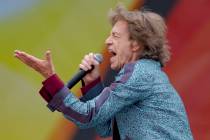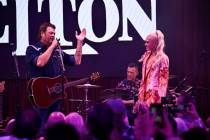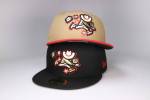Standstills of identity part of the natural cycle of life
I recently heard a statement made by a woman to a man: "You need to find yourself." I have been thinking about that comment since I heard it. The comment wasn't meant in a religious form. She just meant for the man to find himself in life as he seemed to have come to a standstill. Do you feel this applies to everyone? Are we put on Earth to "find ourselves," and when are we supposed to know?
I am a 70-year-old woman who has raised a family, held good jobs, and (I'm) still reasonably healthy. Am I supposed to sit down in front of a mirror and ask myself, "Have I found myself?" or would you put less emphasis on it entirely? Perhaps I am putting too much into the statement and should just be satisfied that I've made it this far.
-- A.R., Las Vegas
On the one hand, I "get" what the woman is saying to the man. His life has come to a standstill. Yes, that happens sometimes. We find ourselves without motive. Without inspiration. Without a defining nexus of meaning or purpose. These moments loosen our grip on felt identity and often are described in some form of the question, "Who am I?"
Sometimes these standstills of identity are the result of the normal, predictable cycles of life. You see it in the restless melancholy of graduating high school seniors. Sadly, I more and more often see it in public school students at large. When I moved through elementary and secondary education, I remember a clear and dynamic relationship between occupying desks in classrooms and meaningful gains toward a life prepared and equipped for purpose, productivity and satisfaction. Today, increasing numbers of students talk and behave as if education is just another arbitrary exercise imposed by grown-ups.
Standstills of identity can emerge as a result of our outgrowing some previously rich and satisfying work or participation in life. It's time to move on, to begin to seek a new chapter of selfhood, but we don't know this consciously. It comes to us first as a symptom of restlessness. A growing feeling of "blah." Other times this important call to self-development comes as the experience of "blah" in important relationships, chiefly marriage. It feels like we've fallen out of love with our beloved, because the love connection feels bereft, empty, dead. But it's a projection. What's bereft, empty and dead is us on the inside! As a strategy for jump-starting standstills of identity, divorce is a loser.
"Empty nest syndrome" is jargon describing another kind of life cycle transition that invites standstills of identity. Who am I if not the father/mother swallowed up in fathering and mothering? It's no wonder that, when children leave home, risk factors for marital conflict increase. Empty nest marriages must be renegotiated and rewired to function without the present, clamoring needs of children.
And, of course, death -- the ever-faithful companion of the life cycle. When loved ones die, part of normal and healthy grief is the necessity of rewiring identity. Part of us has died, too.
Standstills of identity also can emerge as a consequence of the random ambiguities of life, especially those that connote significant loss. Tornados, physical trauma or the onset of debilitating disease, a house fire, an economic crash blowing away 20 years of hard work like a pile of leaves in the wind. Positive ambiguities, too, can provoke standstills of identity: sudden celebrity, winning the lottery, the achievement of a lifelong dream, etc.
These windows of time are unsettling. Disturbing. This part of the human journey can and does sometimes provoke psycho-emotional crisis. The crisis tempts behavior that ranges from inexplicable inertia to odd and erratic or even self-destructive.
On the other hand ...
I smiled when I thought of you sitting before a mirror asking whether you'd found yourself. The problem with the jargon "Gotta find myself" is the way it so easily attaches itself to lauding self-absorption, self-consciousness, a socially encouraged blithe narcissism, and thereby a justification for ignoring the requirements of a responsible life. I can't get a job right now ... I gotta find myself. I can't stay married to you ... I gotta find myself. Yeah, boy, does this marijuana help me find myself! Etc.
No, A.R., I read your letter and think you are quite comfortable in your own skin. You know how to be "a self." You know there is a difference between faithfully attending to an authentic crisis of selfhood and self-indulgent navel-gazing.
The best strategy for "finding ourselves" is to stop looking and throw ourselves headlong into life as life is.
Steven Kalas is a behavioral health consultant and counselor at Las Vegas Psychiatry and the author of "Human Matters: Wise and Witty Counsel on Relationships, Parenting, Grief and Doing the Right Thing" (Stephens Press). His columns also appear on Sundays in the Las Vegas Review-Journal. Contact him at 227-4165 or skalas@reviewjournal.com.























